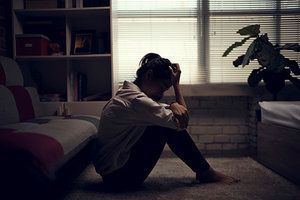The most important relationship I seek to nurture in the treatment room is the one a patient has with their own body. We live in a culture that teaches us to override pain, defer to outside authority, and push through discomfort. Patients often arrive hoping I can “fix” them, but the truth is, we can’t do the work for them. We can offer guidance, insight and support, but healing requires their full participation.
Restoring What is Natural: Treating Mood Disorders With the Luo Vessels
What is happiness? How does it affect our health? What is depression? Or the lack of happiness? The Ling Shu examines these questions and the philosophy related to them in-depth, suggesting they are important to the practice of acupuncture.
As acupuncturists, we care for people's emotions, minds and souls, not just their physical bodies. The Luo Vessels are conduits of Ying Qi, the energy most associated with the mind and emotion. The Luo are a study of mind and emotion as they affect the physical body.
Our patients bring to us some type of unhappiness they need help rectifying. Perhaps it's physical pain or physiological disturbance. Maybe it is an emotional or mental issue, or even something "spiritual" related to "the soul." As we know, Chinese medicine embraces all experience of being human: mind, body and spirit.
Perhaps it's my own orientation towards the world, but when I'm diagnosing I often ask "what is making this person unhappy?" Then I assess what energetic "level," and in what organ or meridian system the dis-ease is rooted.

I use the Luo Vessels a lot in my practice. To me, they are usually my first "go-to" intervention: my way of making first contact with the patient. Later I may diverge into other channel systems; But the Luo can reveal much at the beginning. They feel like a ritualistic way of honoring and acknowledging the suffering of the person I'm working with. They also encourage expression. They can often facilitate an easier time locating feelings, thoughts and the capacity to speak and release them.
The Luo, as presented in Chapter 10 of the Ling Shu present a psychosocial model of the human experience. The interpretation of this chapter by Jeffrey Yuen however is what brings this chapter to life. He describes Chapter 10 as a developmental process of the social self. The Primary Channels represent the development of the psychosocial self while the Luo represent the difficulties. I use this model as my basis for working with patients and their life struggles. The Luo represents the psychological, the social, but also the psychosomatic: how the mind impacts the body and vice versa. It is a showcase of how our minds make us sick: the way unhappiness takes away our vitality, freedom and health.
I have been working with a woman recently who taught me much about the Triple Heater's Luo Vessel. This lady has a dramatic history of familial abuse and self-punishment. She is highly driven and troubled. She often states how much she dislikes herself, putting much pressure on herself to be more "spiritual" and "pure." What struck me most about this lady was how unhappy she seemed. She had an inability to relax and it took awhile for her to trust me. She'd lay on my treatment table very restless, constantly asking me to adjust the pillow, the bolster, the blanket, the light.
This patient lacked the classical physical symptoms associated with the Triple Heater Luo: tension and/or weakness of the elbows, yet working with this channel gave her the strongest relief. I looked beyond the literal physical symptom into the imagery and philosophy of the Triple Heater Luo: rigidity, fixation and the inability to be flexible.
She obviously was creating a significant amount of internal wind as suggested by both her restlessness, inability to relax and moodiness. This was due to the tightness in her pulses, which illustrated the tension in her mental outlook. She lived as if she was still caught in her difficult past, even though her present circumstances were quite good.
Role of the Triple Heater
The philosophy of the Triple Heater that most related to my patient comes from the Neo-Confucian era of the Song Dynasty. During this historical period, the major role of Triple Heater was expanded beyond irrigation of the body's waterways to governing the dissemination of Yuan Essential Qi throughout the body. It is the Triple Heater that creates personality as it irrigates essence into organs via the Bladder Shu points of the back.
The Ling Shu is interested in progression. The channels have an order to them that describes both the process of physiological development, as well as pathological mutation. During the stage of the Pericardium Primary Channel, one of the issues that can arise is Zang Zao, often translated as "visceral agitation." Trauma can disturb the Triple Heater in its dissemination of Yuan Qi, leading to a lack of irrigation within the organs.
Disturbance to physiology often manifests itself through the Luo Vessels. I assessed that it was childhood trauma as it affected her Pericardium that began to impact the Triple Heater of my patient creating Zang Zao, which she was trying to unconsciously mediate through her rigid personality. This is what led me to the Triple Heater's Luo Vessel as an initial treatment strategy. She had impressive results. Throughout our time together, we learned much about the Triple Heater.
My first instinct was to go into the Pericardium either through its Luo or via the Extraordinary Vessel Yin Wei Mai to work out the past trauma my patient spoke so frequently about. However, this only seemed to agitate her more. It became clear that she'd worked through much of her past already. It was the unconscious habit she retained that was causing her problems.
Wei Qi, Ying Qi & Yuan Qi
In the treatment of the mind and emotions, there are three levels we can work: the Wei Qi surface level which relates to the level of "mood," the Ying Qi internal level which works on "emotion," and the constitutional Yuan Qi level which works on the level of repression. Both the Wei and Yuan levels manifest as unconscious, behavioral expression. My patient was very aware of her emotions, she'd worked extensively through her past and family dramas. It was the level of mood that she most struggled with.
To treat the mood, the Wei Qi level of the body had to be "opened." The Wei Qi level is managed organically by the Lungs and Liver. Needling LU-7 Lie Que and LR-5 Li Gou opens the level of mood. Adding TH-5 Wai Guan focuses the treatment into the Triple Heater where the stagnation was thought to be. This treatment was repeated one or two times a week for several months.
What resulted was one of the quickest transformations I've witnessed. She radiated joy, and described feeling relaxed and happy, more often and more fully than she could remember. We had several conversations about the Triple Heater and its philosophy. I remember being taught by Jeffrey Yuen that the virtue of the Triple Heater is "sincerity." This is a Neo-Confucian concept, which teaches that we must be honest with ourselves. We may be taught that we should be a certain way, but what really matters is what is in our hearts. The Triple Heater is the art of being human. When we can allow the Yuan Qi to disseminate naturally and smoothly, we can experience ourselves naturally. This is an area which many of us have conflict.
My patient and I discovered together that maybe it wasn't so important for her to be "pure" and "spiritual," but rather to find a way to be joyful and human. This was somewhat of a revelation. She found within herself that her true nature seemed to be one of joy and fun, rather than discipline and piety.
However, it wasn't her constitution we needed to work on to achieve this realization, but her unconscious Wei Qi level of mood. All she needed was an opening in her senses: the ability to see things differently. Before working with me, she'd always had very strict healers, teachers and parents. This was seemingly the first time she was encouraged to play and smile and enjoy her human experience. And somehow, this had a powerful, healing effect on her. She decided ultimately to choose a new way of seeing herself and her place in the world.



